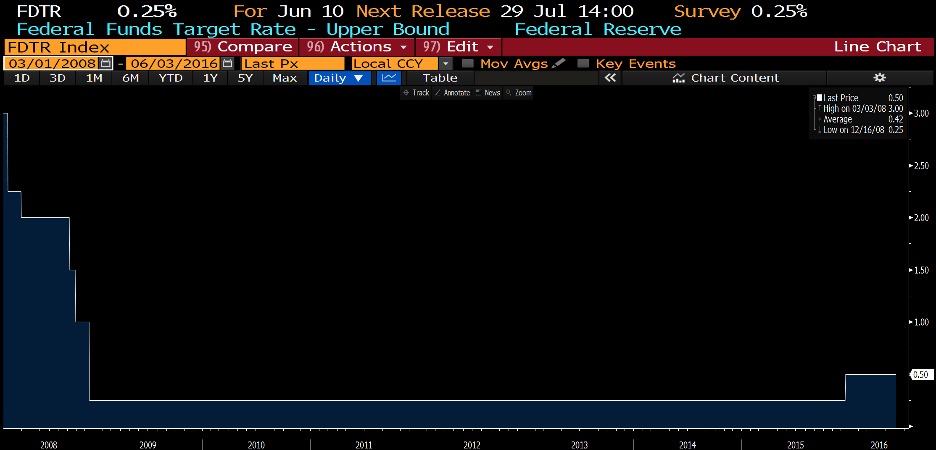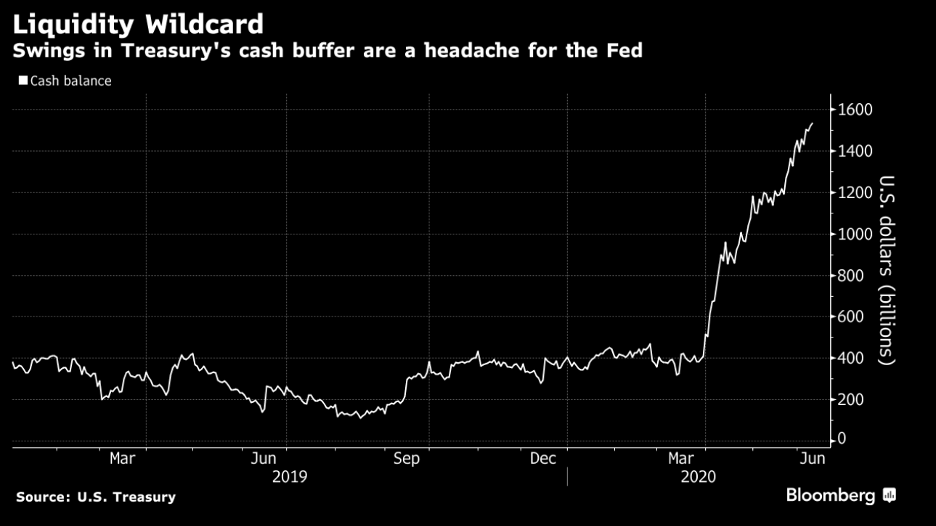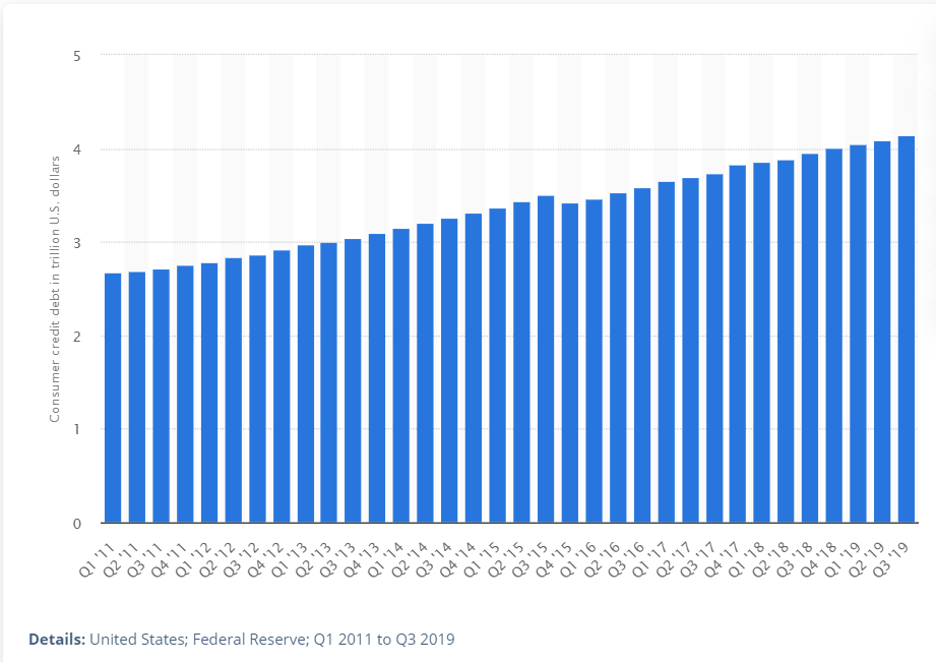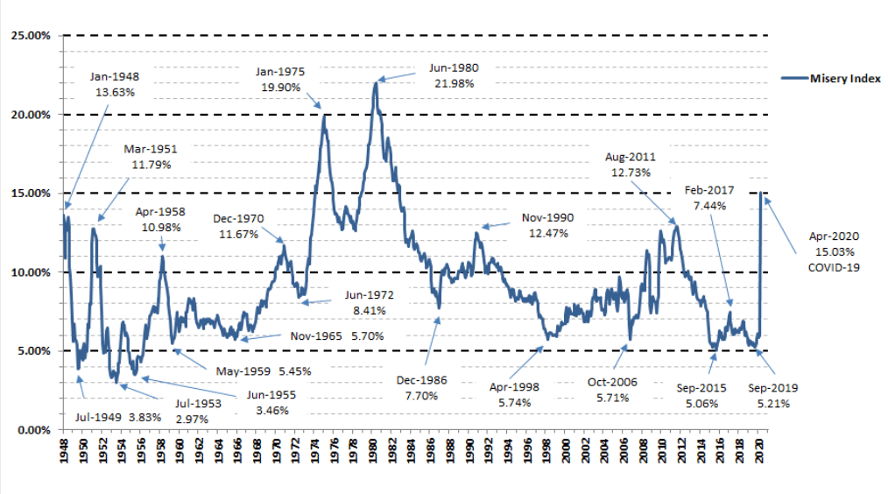I'm not going to
claim that Back to the Future was a great movie—though I think Michael J. Fox
was pretty cool back in the day, and it reminds me of what we are going through
right now. Some of you will remember
that during the financial crisis of 2007-2010 (ish) the Fed lowered the Fed
Funds rate to 0%. Most people thought it
would be a short-term measure that we would work out of in a couple years. As
you can see in the graph below it lasted for seven long years. Seven years.

When the Fed finally raised rates in December of 2015, I'm
guessing there were a lot of people running models that had never seen rates
above zero before. Money managers had to
go way back in their models to figure out how to even change the inputs! As they say, history always repeats itself—and
here we are again.
Luckily for us, all of the Fed governors have a perfect
crystal ball into the future. They know
exactly what's going to happen. In fact,
100% of the voting members say that there will be no change in short-term
interest rates for the rest of 2020 & 2021 and only a very small minority
believe things will start to change in 2022.
Not only do they have perfect insights into rates over the next 2 ½
years, but they also have a pretty strong consensus on unemployment. I wish that my knowledge was that
prescient! I could make a lot of
money.
Does anyone really believe that they know exactly what is
going to happen? The stock market took
the news pretty badly, having one of its worst days in the last year or two,
and the DOW dropped 1,800 points. Yes,
the market also had renewed fears of COVID-19, but do any of us really think we
know the outcome of the virus? I
don't. If you do know the exact
trajectory of the virus, please let me know.
In addition, we have a huge election in 5 months. According to Real Clear Politics, we could
easily have a change in the White House and possibly the Senate. Do you think
that might affect the capital markets?
How can the Fed even make a rational claim that they know what will
happen through this period? No one knows
the future. It is crazy to make any
financial decisions based solely on these predictions.
I think we should be looking at multiple scenarios to
examine a few extreme possibilities—and then, hope that none of them
happen!
First, we need to consider the possibility of negative
interest rates in the short part of the yield curve. Many of the first world countries have
adopted the idea of negative central bank rates. To ignore the possibility of it happening
here would be short-sighted. Yes, it is
horrible for banks, but it is actually pretty cool for central banks. Instead of paying out for the required
reserves that banks hold, it turns into a revenue source (aka. TAX) and creates
revenue for a system that is massively in debt.
From my limited research, it does not seem that it would be a completely
crushing blow to most community banks.
It would be really annoying though.
Larger banks that have massive cash piles would definitely suffer
more. Powell and others have publicly
decried this idea, but political winds are shifting fairly quickly these
days. It is tricky to say how the
general populous would react to the potential for mortgage/borrowing rates in
the sub 1% range. In some European
countries there are actually mortgages at negative rates (check out Jykse Bank).
Although, you will have to move to Denmark to take advantage.
Ignore the possibility at your own peril. At least ask the questions of how you might
respond.
Secondly, as I discussed last week, we cannot ignore
inflation. There are a lot of very smart
people that believe the potential for significant inflation in the medium-term
is a serious possibility. Most of them
are way smarter than me and have research people working on this premise. All I know is that the printing presses are
working overtime. Bloomberg reports that
the U.S. Treasury is sitting on a near-record 1.5 trillion pile of cash.

A lot of that money will go into buying Treasury securities
at the pace of 80 billion a month and MBS at around 40 billion a month. The balance sheet just keeps ballooning—does
it make any sense?
Now, I think this could actually turn out to be a much
better scenario for the banking industry, as long as it is contained. Periods of inflation and rising rates are
usually concurrent with periods of steeper yield curves and higher
profitability for most financial institutions. The key to this scenario is
containment. However, as with most
things, extremes do also cause problems.
Consumers would also not be too thrilled with their adjustable rate
borrowings going significantly higher, especially since consumer debt has grown
significantly in the last decade from around 2.6T dollars to almost 4.2T at the
end of 2019. Stats aren't available for
the first quarter of 2020, but does anyone think they have shrunk?

So, that brings me to a third and very unfortunate scenario—stagflation. A common definition of stagflation is that prices rise even during a period of very slow economic growth, or even a decrease in GDP. I was still young the last time the US experienced stagflation during the 70's, when OPEC relentlessly raised the price of oil and the US economy had negative growth. I'm glad I was young. The stagflation of the 70's gave rise to a little-used index called the misery index, which is a combination of inflation and unemployment. Thankfully, we don't hear much about it these days. I am thankful for small blessings, but it is hard to ignore the history of the index which shows that we aren't that far away from some significant periods in the past.

So, what's the point? If ever in the history of the financial markets, now is the time to be looking at multiple scenarios. Unlike the Fed officials, none of us have a crystal ball telling us exactly what is going to happen. I have been trading and working in the financial markets since 1989 and have never had less certainty than today. It is very strange that at the same time most market participants are the most confused that the people "in charge" give us a 100% consensus for the next 2 years. Don't fall prey to this confident outlook.
Final, final thought…Disney with masks? No thanks.


